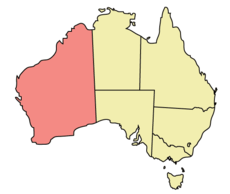
I have recently been certified to lead guided walks through Kings Park here in Perth and one of my friends said she might be interested to see some pics of the strange plants here and maybe read a little of the presentation we make in the park. Well, here goes.
Intro
Kings Park is the largest inner city park in the world. It is just under 1000 acres with 2/3 of it preserved as "native bushland." Seventeen acres are utilized as a botanical garden and the rest is playgrounds, cafes and expansive lawns for the public to use.

Perth itself is a city of about 2 million people, but the park land was set aside back in 1872 when the population of Perth was about 9,000 and there were less than 25,000 people in all of Western Australia. WA is five times the size of Texas and it is more than 1300 miles from Perth to the nearest city of more than 1 million people. Perth is the most isolated city in the world in terms of geographic distance to anything of consequence.
The park is on a high hill overlooking the Swan River Basin and Matilda Bay. Across the basin is a clear view of the Perth Hills aka The Darling Range, named after General Ralph Darling who put together the expedition of Captain James Stirling aboard the HMS Success that established the Swan River Colony (Perth.) The hill on which Kings Park sits is named Mt. Eliza after Darling's wife. No one ever accused Perth's early settlers of being anything short of politically astute. The park is actually on the most attractive land in all the Swan River Valley... just the sort of place I would have put my house if I had been Stirling. (No one ever accused me of being in the least, politically astute.)
The land in the Swan River Valley is very poor. Australia is a continent as opposed to an island. It used to be part of the ancient super continent Gondwana until it drifted South and West to its current location. There have been no "earth creating events" here for millions of years. No earthquakes, no volcanoes, nothing. The primary geologic player has been erosion with the rain, wind and sea working year after year to leach out and erase any remnant of nutrient in our "soil" and leaving only a layer of sand atop a limestone base. Not really ideal conditions for growing plants, much less food crops. This poor soil played a huge role in checking any population growth in the area until gold was discovered in 1892. That year Perth's population doubled and it was over 130,000 two years after that.
It rains only about 3 or 4 months and all in the winter months of the year (June-August) and the rest of the time the sun streams down unimpeded by clouds. We have a mild climate, but the sun is strong, even if not hot. The poor soil and oppressive sun of our area may seem like a detriment to botanical life, but instead it has provided a perfect laboratory for life to adapt. Being so remote to the rest of the world, the plants here, like the animals, have taken a path not shared by the rest of the world and as a consequence there are more than 4000 known species of plants in the southwest corner of WA, more than in any other similar sized area in the world, and over 80% of them occur nowhere else in the world.
A year ago when I arrived here, I took a series of bushwalks into the wild. On those walks it seemed like I couldn't go 10 yards without seeing some plant that looked different than anything I had seen before and I decided to try to learn a thing or two. That led me to the botanical garden and in turn, to the guides program.
Well, enough background. Just keep in mind the notes about the soil and sun. Those features will likely be a recurring theme in my discussions as I post pictures of the plants here.
Like any tour, this will work best with comments from the folks that read this. If I have your comments, I can gauge levels of interest and adjust what I post to the things that seem interesting to you. Otherwise, you can read what I write.. or not. I hope you enjoy it though, because I do.
I'll close out this post now and maybe tomorrow I'll post a bit about a flower here that is purported to be able to "turn hearts."
Welcome to Kings Park.
 |
No comments:
Post a Comment